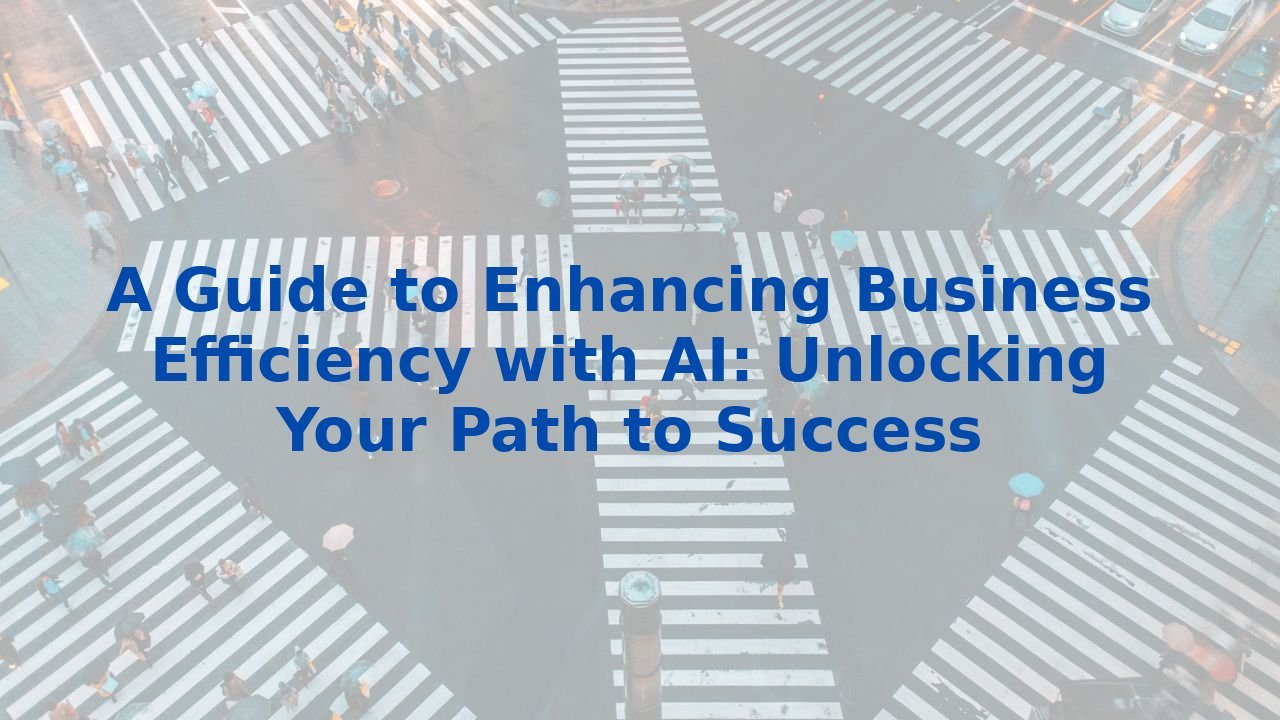A Guide to Enhancing Business Efficiency with AI: Unlocking Your Path to Success
A Guide to Enhancing Business Efficiency with AI: Unlocking Your Path to Success
Introduction
In a world where time is of the essence, organizations are on an endless quest to discover innovative ways to enhance efficiency and maintain a competitive edge. Enter Artificial Intelligence (AI)—a powerful ally that is reshaping the business landscape. By automating mundane tasks, sharpening decision-making, and streamlining various processes, AI offers the pathway to greater productivity and operational excellence.
What is AI Process Optimization?
AI process optimization refers to the methodical use of AI and machine learning technologies to refine business processes. This approach entails analyzing data, automating repetitive tasks, and underpinning strategic decisions. The core objectives of AI process optimization are to reduce errors, amplify productivity, and bolster operational efficiency.
Key Benefits of AI in Business Processes
1. Automating Routine Tasks
Consider the power of AI in liberating employees from the shackles of routine tasks such as document processing and data entry. By automating these high-volume activities, organizations not only decrease the likelihood of human error but also free up invaluable time for employees to focus on strategic initiatives.
2. Improving Decision Making
A data-driven world requires insightful decision-making. AI excels in this domain by offering predictive recommendations based on data patterns. These insights empower organizations to make informed decisions, such as simulating the impact of price changes on profitability, ultimately propelling performance forward.
3. Enhancing Customer Service
In the age of instant gratification, customer expectations are at an all-time high. AI-driven chatbots are stepping up to the plate, managing basic inquiries efficiently. Furthermore, advanced AI systems analyze customer feedback to pinpoint areas for enhancement, ensuring a more personalized experience that keeps customers coming back.
4. Optimizing Product Development
In product development, time is a precious resource. AI facilitates generative design software that rapidly explores multiple design possibilities. This innovative approach not only saves time but also directs resources away from producing non-viable prototypes, enhancing overall effectiveness.
5. Streamlining Supply Chain Management
Supply chains are vital to operational success. Using AI to analyze purchase data in real-time allows businesses to detect discrepancies, such as unexpected product shortages. This proactive measure ensures timely restocking and maintains a robust customer satisfaction rate—all crucial elements of a thriving enterprise.
How AI Enhances Business Process Management
1. Process Discovery
AI employs tactics such as process mining and pattern recognition to map existing organizational processes. By highlighting inefficiencies, AI lays the groundwork for targeted improvements, illuminating the path to productivity.
2. Process Mapping
The landscape of business is ever-changing. AI consistently analyzes data, producing current process maps and ensuring documentation is up-to-date. This dynamic oversight allows businesses to remain agile in the face of shifting market demands.
3. Process Automation
Incorporating AI bots to automate traditionally manual duties such as data entry enables organizations to significantly decrease the time and effort required for these tasks. Employees can then devote their energy to value-driven activities that truly matter.
4. Process Management
AI’s continuous monitoring capabilities keep a pulse on processes. By leveraging historical data, it can preemptively alert management to potential issues, ensuring obstacles are resolved before they escalate and disrupt operations.
5. Process Improvement
True enhancement comes from continuous learning and adaptation. AI provides data-driven insights that fuel predictive modeling and root cause analysis, ensuring that business processes evolve in tandem with organizational objectives and industry standards.
The Role of AI in HR Processes
Human Resources have not remained untouched by the AI revolution. Efficiency in recruitment, onboarding, and career path personalization has been significantly elevated. AI streamlines initial assessments, mitigating the manual effort of candidate screening and enhancing the overall employee experience.
Training Employees for AI
However, introducing AI into the workplace is just the beginning. Its full potential shines only when employees are trained to harness these powerful tools effectively. Focused training programs can empower employees to integrate AI into their workflows and leverage AI-driven insights, ensuring that the benefits extend beyond technology to enrich the skillset and productivity of the workforce.
Conclusion
As we close this exploration of AI's impact on business efficiency, it becomes clear that AI is not merely a tool but a transformative force in optimizing business processes. By fostering automation, enhancing decision-making, and streamlining various operations, AI paves the way for organizations to remain competitive and achieve lasting success. Embracing these capabilities requires forward-thinking and adaptability, yet the reward—a marked improvement in efficiency and productivity—paints a promising path ahead. Organizations eager to evolve will find solace and strength in the embrace of AI.
To learn more about equipping your workforce with AI skills, consider exploring Complete AI Training for comprehensive programs that align learning with your organizational goals.



